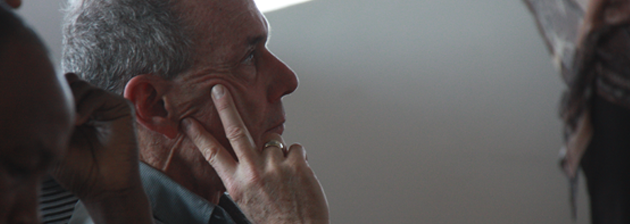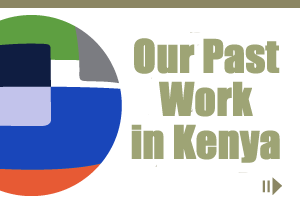Passion to change the world led to the founding of Internews, an international organisation that helps journalists improve their work, among other projects
By GEORGE ORIDO - The Standard
Several decades ago, David Hoffman was working in his garage as he strived to build peace through the media.
Today, he looks back at those days with satisfaction. Since then, the work he started in a small village in San Francisco, California has blossomed into an international organization that also helps journalists to improve their work.
The founder and CEO of Internews Network, Hoffman is in the country working on a new book on peace and the role of the media in the 2007/08 post- election violence in Kenya.
“When I was here earlier it was hard to imagine a live broadcast of such nature as The Hague proceedings on the Ocampo Six,” says Hoffman.
 |
| David speaks to journalists and staff at the Kenya office |
KENYAN JOURNALISTS
The $60 million-a-year budget organization has also lifted the careers of Kenyan journalists.
So huge has the organization grown that he no longer tracks minute details of projects it undertakes.
Hoffman, who hails the media for playing important roles in changing society, also warns against abuse.
He cites a radio station in Rwanda accused of fanning the genocide, and the confirmation of charges against Kenyan journalist Joshua Sang. The International Criminal Court accuses Sang of fanning post-election violence.
Hoffman was initially involved in peace-making efforts between the US and the former Soviet Union at the height of the Cold War.
At the time, he and other partners started media campaigns that would encourage dialogue, understanding and reduction of war rhetoric between the then superpowers.
They first produced a series of what they called ‘Space- Bridges’, with televised links be- tween American and Soviet audiences who discussed a variety of subjects via satellite. Such broadcasts were rare at the time, as satellite technology was just taking off.
SENSITIVE ISSUES
In the late 1980s Space-Bridges evolved into an America Broadcasting Corporation/Soviet State TV produced series named Capitol to Capitol, which enabled members of American Congress and the Supreme Soviet politburo to debate all manner of sensitive issues.
“This way they were able to see each other up close, a major societal advance then for peace,” says Hoffman, who is on his second visit to Kenya.
This effort won Internews an Emmy.
But after the cold war and the fall of the Soviet Union and communism, Hoffman and the rest of the team realized that there were pockets of war happening all over the world.
“We decided to expand our mandate to include the propagation of peace using media in trouble spots across the world,” he says.
Hoffman talks of how sad he felt when he saw women fetching water, only to be killed by sniper bullets in Yugoslavia.
It made him search why the war was going on without intervention from western world with all its arms like Nato.
“I felt guilty as a white man to see these atrocities continue unabated. I went to the studio and wept for the women of Sarajevo.”
Hoffman regrets the fact that the West did not intervene to save 100,000 lives in Bosnia then and later another 700,000 lives in Rwanda in 1994.
After the war ended, Hoff- man sat with his staff and together, they made a decision to carry the proceedings of the War Crimes trial in Yugoslavia.
“We knew those who needed to see these proceedings were not going to see that justice was being done. So, we used satellite TV to beam them live eleven hours every day across five TV channels,” he recalls.
TRAVEL GRANTS
And from thence Internews has grown in size and stature with a presence in over 70 countries. The Kenya country programme is only second to that of Afghanistan – the largest in the world. Many a Kenyan journalists have sharpened their tools of trade here with a couple of CNN Journalists of the Year Awards landing on stories and beneficiaries sponsored by the Internews’ travel grants.
Rodgers has his eyes set on the rich Kenya’s splendor and admits it is the most beautiful country he has seen.
He is planning to turn leadership to someone else and encourages the rest to plan transitional provisions so that founders do not cling to leader- ship to the very end.




